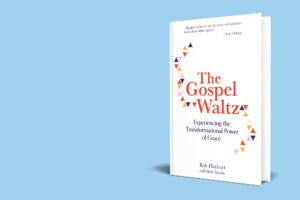HOLLY MACKLE | CONTRIBUTOR
When my pastor, Bob Flayhart, asked me to help adapt his life sermon into a book, my immediate wash of excitement quickly turned to a flood of fear. In my experience, it’s hard not to dignify any relational conflicts that arise in inter-gender work with a weight they should never carry. This feels especially constraining in the body of Christ, where an often unspoken sense of higher stakes in working together betrays an underlying level of disunity in the church. As such, I imagined all the ways working alongside Bob could go terribly wrong—all the scenarios in which I could disappoint, frustrate, or annoy him. I spoke my hesitation to a friend who wisely didn’t quash it, but rather turned the tables to the what if. “What if one or all of those things do happen?” she pressed. “I don’t knoooow,” I whined. “What would I do?”
Instead of looking at me like I had three eyeballs, in a level, somehow non-judgmental tone she replied with the answer whose obviousness still stuns me to this day: “You waltz.”
Oh right. Got it.
It seemed my wash of fear would be a good place to employ the very framework Bob asked me to help adapt from sermon into book form, which he termed the Gospel Waltz. It also happens to be the precise skill to which I am witness number one as to its transformative power. Yet how quickly I forget.
I am a writer who works largely in collaborative contexts, sometimes alongside the men of our church, which means this is hardly the first time this fear has flared. And I know I’m not alone, as so many women in the church labor alongside men in ministry and service contexts. The questions of what to do if I disappoint him or annoy him aren’t unique to me, and the truth is they barely scratch the surface of the deep-seated fear. It strikes me that the real question as we seek to work together across gender is: how do we do this well? How do we honor the Lord in our projects, planning, and partnership both within the church and out into the larger world?
Remember Our Relationship
Paul was great at this. I love to hunt for the litany of men and women listed at the end of several of Paul’s letters and wonder at how those relationships looked in the flesh, as co-laborers with specialized giftings for the cause of Christ. There are those noted for praying (as Epaphras in Colossians 4:12) or hosting (as the couple Aquila and Prisca from 1 Corinthians 16:19), or my personal favorite, Tertius the scribe, waving from his position hunched over a finicky papyrus in Romans 16:22. It’s the individual people and personalities behind these giftings—our Bible-times or modern-day siblings—who we are to “love with brotherly affection. Outdo[ing] one another in showing honor” (Rom. 12:10). “Brotherly affection” isn’t some quaint or down-homey reference, but a mandate toward radical respect, care, and regard. It’s the only healthy lens through which we are to engage with one another. In Christ, we are sons and daughters of God (John 1:12-13), literal brothers and sisters on equal footing before him (Gal. 3:28), and siblings to his Son, Jesus (Mark 3:34-35; Rom. 8:29; Heb. 2:11). We aren’t merely to reference this but welcome its radical power in our relationships.
Reflect on Our Identity in Christ
We serve a God who made us both male and female, unique and complementary. This was done not just for the companionate, redemptive, and procreative purposes of those who are called to the covenant of marriage, but additionally and far more widely for fraternal relationship, as siblings who have much to offer to and learn from one another. We are tasked with acting as one body (1 Cor. 12:12). This is huge, redemptive, kingdom-scale work, and naturally opens its participants up to big attack.
Some darker shadows of church history remind us this is prime real estate for the snares of evil, both in the all-too-expected realms such as inappropriate relationship or power struggle, or in the lesser-anticipated such as mistrust or, as with my story, fear that led to crippling timidity. But for those made new creations in Christ, there is supernatural power in acknowledging that God in us is at constant work. A nudge toward welcoming the power of the Holy Spirit is not a bootstrapsy call to co-laboring out of our own efforts, but rather an invitation to not be shut down by fear of what might be. Instead, it’s Don’t you see, brother? Don’t you see, sister? He who is in us is greater than he who is in the world (1 John 4:4). We don’t have to fear one another or miss out on the joys of working together.
But until Christ returns or calls us home, in co-laboring we are bound to find ourselves in sticky or troublesome situations where we may be tempted to allow the differences in our genders to be the foil that prevents the application of the gospel to the situation. Not if but when this happens, what are we to do? We hear the wise, level, and non-judgmental tone of my friend and heed her suggestion to waltz.
Employ the Gospel Waltz for Transformative Power
When it comes to actually living out abiding in Christ, my friend had just the ticket. To counter the fear that threatened to keep me from an opportunity to serve alongside my brother, she reminded me of the Gospel Waltz, an ongoing three step of repenting, believing in the supernatural power of the Spirit, and then fighting to walk a transformed life. The practice of thinking in terms of these three steps has personally changed my life, giving me a (more often than not) memorable and tangible handle on how to engage with Jesus as I go about a day finding myself willingly or surprisingly ensnared in sin’s tangle. And beyond that, they’ve given my community—my church—a vocabulary of urging one another on toward life and godliness.
As we abide in Christ—as we waltz toward him and toward one another as brothers and sisters—we are empowered to ask God to make us the kind of woman, man, person who seeks his face above all. In spite of the myriad of ways evil seeks to hunt us regarding relationships across gender, there is untapped strength recognizing we are new creations living in the mercifully toothy bite of grace. And the good news is it doesn’t just sooth, but also transforms us into new creations who seek the radical unity called for in the body of Christ.

Editor’s Note: Learn more about the project Holly has worked on with her pastor, The Gospel Waltz, here.
*Photo by Amy Hirschi on Unsplash

Holly Mackle
Holly Mackle is the co-author of The Gospel Waltz alongside Bob Flayhart, author of author of Bright Star, The Story of Esther, the family Advent devotionals Little Hearts, Prepare Him Room and Connected Christmas, and curator of the mom humor collaboration Same Here, Sisterfriend, Mostly True Tales of Misadventures in Motherhood. Holly and her Realtor husband, David, wrangle two young girls in Birmingham, Alabama, where she is a lower school librarian. Connect with Holly on Instagram @hollymacklebooks.

